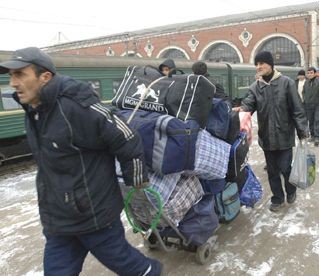BISHKEK (TCA) — As migrant-phobia sentiments are on the rise in Russia towards labor immigrants from Central Asian countries, including Kyrgyzstan, we are republishing this article on the issue, originally published by EurasiaNet.org:
Russian politicians are sowing hatred for the people of Kyrgyzstan.
Not the words of a minority rights activist, but those of devoted Kremlin ally and president of Kyrgyzstan, President Almazbek Atambayev.
“With deep regret we see that in recent years in Russia, we hear ever louder voices inciting xenophobia and enmity between our brother nations,” he said at an event to mark Victory Day on May 9.
In his speech, Atambayev recalled an old interview in which Russian writer Mikhail Veller is said to have described skinheads as the unwitting defenders of Russian statehood.
“In other words, by killing hundreds of defenseless people, including children, skinheads are, it turns out, protecting Russia’s interests,” the president remarked sarcastically.
Migrant groups have voiced concerns that the St. Petersburg metro bombing in April, which Russian authorities have pinned on a conspiracy of religious fanatics from Central Asia, has given rise to a fresh surge of foreigner-bashing.
Atambayev seems to agree, and he singled out Russian State Duma deputy Konstantin Zatulin for criticism for calling on TV for stricter controls on the arrival of migrants from Kyrgyzstan.
While excoriating racist and exclusionary rhetoric in others, however, Atambayev engaged in his own unsavory language.
“It is not Zatulin and Veller’s place to talk about how the Kyrgyz are foreign to Russia. It is more likely that it is their ancestors, to judge by their surnames, who came to Russia from the deserts of Palestine or the forests of Europe,” he said.
Although his name was seemingly not mentioned, Atambayev may possibly have also been alluding to Russian opposition leader Alexei Navalny, who has called repeatedly for the instatement of a visa regime with all Central Asian countries.
The recurrent appearance of migrant-phobic rhetoric in public life in Russia is an indisputable fact, although the government in Moscow tends to pursue an awkwardly ambivalent line on the matter. While allowing a limited dose of inflammatory language to seep into public consciousness through Kremlin-approved politicians and on state media, there are also regular, albeit token, calls for tolerance.
On some occasions, the mask slips somewhat, as occurred in a lengthy report out of Kyrgyzstan following the St. Petersburg blast. Setting up the report on Russian state TV station Pervy Kanal, the anchor bemoaned the difficult of keeping out the “flood” of Central Asian migrants.
The report that follows features several interviews in southern Kyrgyzstan with repentant, self-identified former members of the militant Islamist groups based in Syria and Iraq.
But what is striking about the report is that, according to what journalists based in the southern Kyrgyz city of Osh have told EurasiaNet.org, the key interviews were facilitated by officers with Kyrgyzstan’s State Committee for National Security.
Kyrgyzstan is hardly a stranger to being smeared by Russian state media, and the reaction of the Foreign Ministry in Bishkek to such fabrications has been notable for its feebleness.
In late March, for example, Pervy Kanal aired a lurid report about what it claimed was a Russian citizen who had been held in captivity for 16 years and made to work as a slave in a village in Kyrgyzstan’s Talas region. When Current Time TV investigated, however, it emerged that the report was little more than a web of outright falsehoods.
Earlier in the year, the same station aired even more outrageous claims that Slavic children in Kyrgyzstan were being kidnapped and sold off to organ traffickers. Pervy Kanal had its claim supported by an employee with the Russian Embassy in Bishkek, provoking milquetoast protestations from Kyrgyz authorities.








